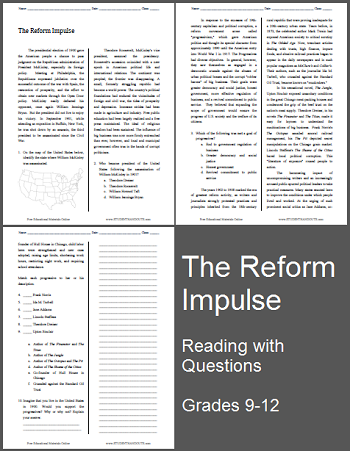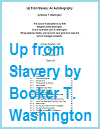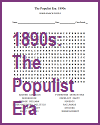| The Reform Impulse Reading with Questions |
|---|
| www.studenthandouts.com ↣ American History ↣ American History Readings with Questions |
 The presidential election of 1900 gave the American people a chance to pass judgment on the Republican administration of President McKinley, especially its foreign policy. Meeting at Philadelphia, the Republicans expressed jubilation over the successful outcome of the war with Spain, the restoration of prosperity, and the effort to obtain new markets through the Open Door policy. McKinley easily defeated his opponent, once again William Jennings Bryan. But the president did not live to enjoy his victory. In September 1901, while attending an exposition in Buffalo, New York, he was shot down by an assassin, the third president to be assassinated since the Civil War.
The presidential election of 1900 gave the American people a chance to pass judgment on the Republican administration of President McKinley, especially its foreign policy. Meeting at Philadelphia, the Republicans expressed jubilation over the successful outcome of the war with Spain, the restoration of prosperity, and the effort to obtain new markets through the Open Door policy. McKinley easily defeated his opponent, once again William Jennings Bryan. But the president did not live to enjoy his victory. In September 1901, while attending an exposition in Buffalo, New York, he was shot down by an assassin, the third president to be assassinated since the Civil War.Theodore Roosevelt, McKinley's vice president, assumed the presidency. Roosevelt's accession coincided with a new epoch in American political life and international relations. The continent was peopled; the frontier was disappearing. A small, formerly struggling republic had become a world power. The country's political foundations had endured the vicissitudes of foreign and civil war, the tides of prosperity and depression. Immense strides had been made in agriculture and industry. Free public education had been largely realized and a free press maintained. The ideal of religious freedom had been sustained. The influence of big business was now more firmly entrenched than ever, however, and local and municipal government often was in the hands of corrupt politicians. In response to the excesses of 19th-century capitalism and political corruption, a reform movement arose called "progressivism," which gave American politics and thought its special character from approximately 1890 until the American entry into World War I in 1917. The Progressives had diverse objectives. In general, however, they saw themselves as engaged in a democratic crusade against the abuses of urban political bosses and the corrupt "robber barons" of big business. Their goals were greater democracy and social justice, honest government, more effective regulation of business, and a revived commitment to public service. They believed that expanding the scope of government would ensure the progress of U.S. society and the welfare of its citizens. The years 1902 to 1908 marked the era of greatest reform activity, as writers and journalists strongly protested practices and principles inherited from the 18th-century rural republic that were proving inadequate for a 20th-century urban state. Years before, in 1873, the celebrated author Mark Twain had exposed American society to critical scrutiny in The Gilded Age. Now, trenchant articles dealing with trusts, high finance, impure foods, and abusive railroad practices began to appear in the daily newspapers and in such popular magazines as McClure's and Collier's. Their authors, such as the journalist Ida M. Tarbell, who crusaded against the Standard Oil Trust, became known as "muckrakers." In his sensational novel, The Jungle, Upton Sinclair exposed unsanitary conditions in the great Chicago meat-packing houses and condemned the grip of the beef trust on the nation's meat supply. Theodore Dreiser, in his novels The Financier and The Titan, made it easy for laymen to understand the machinations of big business. Frank Norris's The Octopus assailed amoral railroad management; his The Pit depicted secret manipulations on the Chicago grain market. Lincoln Steffens's The Shame of the Cities bared local political corruption. This "literature of exposure" roused people to action. The hammering impact of uncompromising writers and an increasingly aroused public spurred political leaders to take practical measures. Many states enacted laws to improve the conditions under which people lived and worked. At the urging of such prominent social critics as Jane Addams, child labor laws were strengthened and new ones adopted, raising age limits, shortening work hours, restricting night work, and requiring school attendance. Click here to print. Answer Key: (1) On map; (2) B - Theodore Roosevelt; (3) A - End to government regulation of business; (4) C - Author of The Octopus and The Pit; (5) F - Crusaded against the Standard Oil Trust; (6) E - Co-founder of Hull House in Chicago; (7) D - Author of The Shame of the Cities (8) A - Author of The Financier and The Titan; (9) B - Author of The Jungle. |
 |  |  |  |  |  |
| www.studenthandouts.com ↣ American History ↣ American History Readings with Questions |








